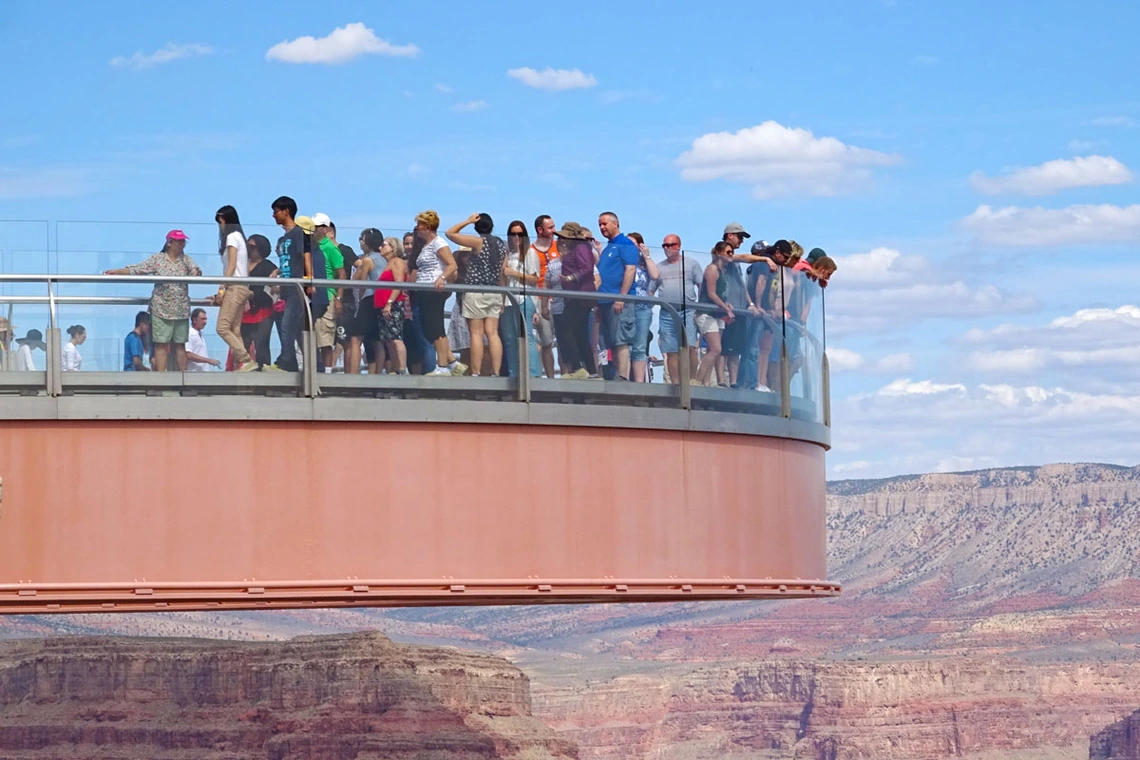
Grand Canyon Skywalk at Eagle Point.
Photo: pixabay.com
by Jake Golden, WRRC Student Research Assistant
Standing above the Grand Canyon on the Hualapai Tribe’s “Skywalk” brings a new perspective to the canyon’s magnificence. The Hualapai Tribe or the “People of the Tall Pines,” is committed to developing economic opportunities for its people in northwestern Arizona and, to do this, the Tribe needs a secure water supply. Arizona is home to 22 federally recognized tribes, of which 14 tribes have some sort of resolved water rights settlements. Settlement of Indian water rights claims is a high priority for the state.
Over the past six years, the Hualapai Tribe has been engaged in negotiations for the settlement of its water rights. The latest development in this process is Senate Bill 1770, commonly known as the “Hualapai Tribe Water Rights Settlement Act of 2017”, which was introduced in early September by Senators Jeff Flake and John McCain during the 115th Congress. S. 1770 is considered the second phase of the Hualapai water settlement. In 2014, negotiations resulted in the Bill Williams River Settlement Act, which resolved tribal claims to water in the Bill Williams River basin and resolved issues relating to the Freeport Minerals Corporation/Planet Ranch dispute. It was signed by President Obama and became law in December 2014. This act was challenged by Mohave County but was unanimously upheld by the Arizona Supreme Court and validated by the Congressional Research Service during 2015.
S. 1770 attempts to accomplish the same ends as Senate Bill 3300, which failed to make any headway in 2016. Like the previous version, S. 1770 calls for 4,000 acre-feet of Colorado River water to be re-allocated to the Hualapai Tribe by the Central Arizona Project from the 67,300 acre-feet of water set aside for tribal water settlements under the 2004 Arizona Water Settlements Act. The bill specifies that the Hualapai Tribe is entitled to use groundwater and surface water within the reservation boundaries and is obligated to store 1,115 acre-feet per year of its 4,000 CAP entitlement to protect against reduced deliveries due to water shortages on the Colorado River.
The bill also proposes funding the construction of a pipeline, the Hualapai Water Project, from Diamond Creek to Peach Springs and then to Grand Canyon West. The pipeline would have the capacity to deliver a minimum of 3,414 acre-feet of water per year. It would be entirely within Hualapai lands, and the tribe would have to pay the CAP’s pumping and energy charges if they choose to have the water delivered through CAP infrastructure. Funding for operations, maintenance, and replacement for water services is included.
With respect to S. 3300, the Department of the Interior released a statement outlining potential problems. The federal appropriation for the settlement was $173.5 million. Over three-fourths of this funding was to cover the construction costs of the Hualapai Water Project, including the pumping plants and water treatment plants. A $32 million Hualapai OM&R Trust Account was to be created for the tribe’s use to maintain the new project, and $7 million was allocated to cover intermittent costs and technical training.
The Interior statement noted that the costs are too high for the small amount of water to be delivered under the proposed settlement. It raised concerns about the inclusion of OM&R costs, believing that this represents a double charge that will set a precedent for future settlements involving CAP water. Finally, Interior was also concerned with the particularly broad waiver of sovereign immunity by the tribe and the inability for the tribe or the United States to object to any groundwater usage outside the reservation boundaries.
These concerns are likely to arise again as S. 1770 makes its way through the legislative process. Regardless, the parties will be working toward a quick resolution through negotiation rather than litigation.

